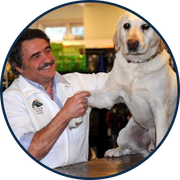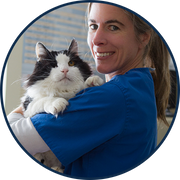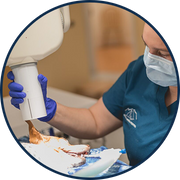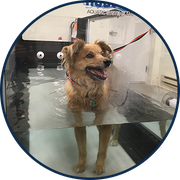Surgical Protocols
At Jackson Animal Hospital, we understand that your pets are a part of your family and that the prospect of anesthesia and surgery can be a bit scary. We have outlined below what to expect if your pet does need to undergo a surgical procedure or dental cleaning in the hopes of making it a less intimidating process and to try to answer any questions that you may have.
Pre-Surgery Protocol
We suggest following these guidelines to ensure the best possible anesthesia experience and recovery for your pet:
- Please do not feed your pet after 8pm the night before surgery.
- Please walk your dog the morning before surgery so that your pet can eliminate before coming to the hospital.
- If your pet is taking medication, please let us know what medication is being taken and how often it is being administered.
- When your pet arrives at the hospital, he or she will be examined, a catheter will be placed, and your pet will then be given a premedication that will control both pain and anxiety. After the premed, your pet will be relaxed and comfortable.
- When your pet is ready for the procedure, we will use very safe induction drugs to get your pet asleep and then use Isoflurane, a gas anesthetic, to keep him or her asleep during the procedure.
- When your pet wakes up, we are right there to comfort him or her until they are ready to go home.
Post Surgery – What to Expect
After the surgical procedure is completed, we will ensure that your pet recovers comfortably and pain-free. At the time of discharge, we will review special post-surgical instructions and (if needed) schedule necessary follow-up examinations. Please read below to find out what to expect as your pet recovers from surgery:
Due to anesthesia and pain medication, most dogs will not be themselves their first night home after surgery. Please be assured that everything possible has been done to relieve your pet from pain. Your pet’s eyes will look different due to an eye ointment administered at the time of surgery. This helps prevent the eyes from becoming too dry. Also, some dogs are very thirsty after surgery. Small amounts of water may be given every half hour until your dog or cat feels like they are rehydrated. Occasionally, a patient will vomit. If this occurs, please remove water, food and medication for one night.
If your pet has an incision, a small amount of bleeding may occur at the incision site the first night. Dried blood makes a natural bandage and should be left alone as cleaning the incision could cause it to bleed more. If you feel that your pet’s incision is bleeding a lot, please call us anytime at 307-201-5700 so that we can discuss your concerns.
Our recommendation is to use an Elizabethan Collar (cone) for any dog that has a surgical incision. If you are actually with your dog and watching him or her you can remove the cone; however, as soon as you are out of the room, are leaving the house or going to bed, make sure to put the cone back on. A dog that licks at his or her incision can cause damage by pulling out the sutures as well create an infection at the site.
Finally, your pet may seem a little whiny or restless the first night he or she is home. This is a response to the anesthesia and although it can seem like they are painful, they are actually a little dysphoric. Please do not double up on pain medication that night as we do not want them overdosed on it. If you are really concerned, please give us a call and we are happy to discuss options with you on the phone.

Orthopedic Surgery
We offer a number of Orthopedic Services, Including TATE™ Canine Elbow Surgery, TPLO Surgery, Hip Replacement, Fractures, and more.

Medicine
We offer all medical and surgical services ranging from routine vaccinations and spays and neuters to bloodwork, ultrasounds, radiographs, exploratory surgery, chemotherapy, MRI and CT scans.

Dental Services
At Jackson Animal Hospital, we specialize in all dental care, from routine cleanings to full mouth extractions, as we believe in the importance of dental health for your pet. Clean and disease free teeth will allow your pet to live a longer and healthier life.

Rehabilitation
Water therapy is an important tool to help animals rehabilitate from orthopedic injuries. We are proud to offer both a Hudson Aquatic Underwater Treadmill as well as a class 3B Laser to assist your pet in recovering to his or her full potential.
